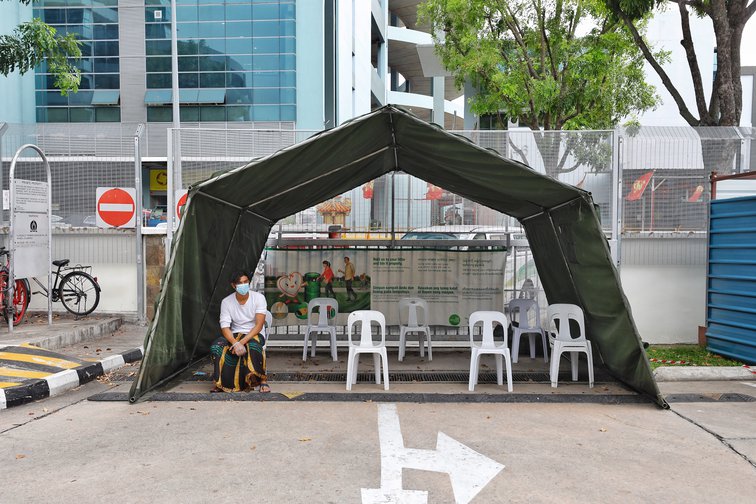
COVID-19 in Southeast Asia: non-citizens have a right to protection too
Arbitrary differentiation between citizen and non-citizen is causing migrants to suffer the worst of the pandemic.
by Sriprapha Petcharamesree
Singapore leads the region in COVID-19 with 28,794 confirmed cases as of 19 May 2020. The majority of Singapore’s cases come from crowded foreign-worker dormitories. Singapore is just one of a number of countries in the region where millions of migrant workers concentrate. The accurate number of migrants is difficult to gauge but it’s estimated that in 2019, around 7-8 million migrants are working in Brunei Darussalam (40% of the total population), Malaysia (2-3 million), Singapore (around 1.3 million), and Thailand (3-4 million). These population are at high risk of infection.
This pandemic has brought up issues of ‘hidden apartheid’ not only on grounds of race but also of citizenship. While Covid 19 can infect anyone, some groups are disproportionately affected especially migrants. Border closing and the delineation between ‘citizens’ and ‘non citizens’ is not only contributing to the public health crisis but is also having a devastating effect on the rights and plight of migrant workers.
The practice of excluding non-citizens from essential health services presents a paradox. The paradox of controlling them in confined spaces while advising populations to respect social distancing; paradox of caring for citizens while limiting resources to care for non-citizens who contribute, as much as citizens, to the economy of a country. In Singapore, this paradox has already resulted in a high price that the state has to pay.
Join the COVID-19 DemocracyWatch email list
Sign up for our global round-up of attacks on democracy during the coronavirus pandemic.
For the past two decades, I have been engaging intensively with issues of migration especially in Southeast Asia. As a researcher of migration and an advocate for the rights of migrants in Southeast Asia, I feel obligated to share my views which, I hope, will generate some reflections and change, even if only a small one, on the treatment of non-citizens.
The daily images of migrant workers living in cramped and dilapidated dormitories/housing facilities with poor hygienic conditions in Malaysia, Singapore and Thailand raise serious concerns about a possible uncontrollable outbreak of COVID-19 among migrants. In Singapore, before the discovery of a high number of cases of COVID-19 among migrant workers, government distribution of face masks and hand sanitizer was limited only to citizens. Non-citizens and migrant workers were not entitled to such courtesy. In Thailand, migrant workers, especially those in informal sectors such as domestic work, agriculture, are not eligible for unemployment benefits. In Malaysia, even though the authorities announced free COVID-19 screening and testing for foreigners including migrant workers, refugees and asylum seekers, it was not clear whether those who test positive would have to pay “foreigner fee” for treatment; and the risk is even higher for stateless persons in the country.
Many migrants, documented or undocumented, and stateless persons, lost their means of living because of the shutdown in all countries in Southeast Asia and have been excluded from the preventive health and treatment mechanisms.
The citizen and non-citizen divide shaped by the concept of nation state and deployed to secure the dominance of ‘citizens’, inevitably marginalizes particular groups considered ‘different’. This practice of ‘differencing’ is reflected in the allocation of resources to citizens who are members of a political community. Non-citizens are not usually entitled to the same ‘membership goods’ such as employment, emergency services and economic resources, political participation, immunity from expulsion and a legal status.
In the context of COVID-19, this refers to health services, access to proper information, right to freedom of movement and expression, right to adequate housing and right to social security/compensation and any other humanitarian assistance that any person should enjoy. The access to ‘membership goods’ depends very much on laws and policies of a particular country, on political will and level of openness of both state and society.
Such arbitrary differentiation between citizen and non-citizen causes migrants to suffer the worst of pandemic. Such a differentiation during a global health crisis which does not spare any person is a reflection of a ‘value based exclusion’ which serves to hide a much deeper form of injustice and inequality within society. In so doing, states will equally suffer the worst health scenario as already seen in some countries such as Singapore. States are urged to apply a more inclusive social protection as well as humanitarian and emergency relief on equal basis among the population living within the same borders.